Your Grief: The First Painful Days
A Personal Word With You
I have been with many persons who have gone through the experience of grieving. I can assure you that you too can emerge from it. When tragedy strikes, many of us find within ourselves resources for coping that we never could have imagined. An inner strength often sustains us. We know that you are not alone – others, too, have experienced such a loss. They have survived. So can YOU! Things can never be the same again because a real part of you has died. But, it is possible for you to go on living with a renewed sense of purpose – a greater understanding of the value of life and a hope for the future.

This is written to help you in the immediate hours, days and weeks – from the time the arrangements have been made with the funeral director to those first few weeks following the funeral service. You need someone who understands – someone to whom you can “listen” – a friend who cares that you are hurting. Let me talk with you, and those closest to you, and I shall try to help you understand much that is happening to you and around you.
Coping With Your Loss
Understanding Your Grief
YOU will die. I will die. We know that this is true. Death is a part of life. Yet, it is difficult to accept emotionally. We cannot believe he/she is gone! Recently I visited a friend whose husband had died after a long illness. She said to me, “I didn’t think it could happen to him”. She could accept the fact of death, but could not believe it would take her loved one.
You experience shock – both physical and emotional. Even when you think you are prepared for the death of a loved one after a long illness, you find that it is hard to accept. Your world has caved in, overwhelming you in an avalanche of emotions. You have never felt this way before. The feelings are so intense. There is an overpowering feeling of helplessness. You feel numb – alone and abandoned – even though you may be surrounded by your family and friends. Because no two persons are exactly alike, what you experience is personal and unique to you.
When death comes after a long and useful life, we tend to be more philosophical and more accepting. We consider it the “natural order of things”. It marks the passing of generations. While we may rejoice in a life that has been well lived in achievements as well as in number of years, we nevertheless feel sorrow. The final chapter of a life is over, and we hurt at the separation from someone we have loved. We know that we will never see that person in this life again.
When death comes after a long illness, you may feel a sense of relief and release. “Now the suffering is over.” But the despair and sense of loss inflicts pain on you so that you may feel that your suffering of the heart has just begun. You have mixed feelings about it all. One part of you is thankful that death has mercifully ended the suffering for your loved one; another part of you is angry that such a disease could take away life.

When death has been unexpected – when it has come suddenly like a thief in the night – you experience disbelief. Your initial reaction is one of denial. “Maybe it isn’t true”. “It’s only a bad dream.” “Tomorrow will be right again.” But as you awake the next morning, you find that you are living the same nightmare. Your mind begins playing tricks on you. You are concerned. You are worried that you may be losing your mind.
The face of death reflects many emotions. While we may share some of the feelings, each of us is affected differently because we deal with our emotions in the light of our own individual and unique experience in living life.
We may experience ANGER, DOUBT, DENIAL, BEWILDERMENT, PANIC, DEPRESSION, FEAR, RESENTMENT, GUILT, BITTERNESS. We want to blame someone – to lash out. Overpowering emotions rush in at us all at once, depriving us of our peace of mind. You may wonder just how much you can endure.
Your anger is intensified if death has come in the early years of life – when life is at full bloom and there is so much for which to live. You feel cheated. You are disappointed. Life isn’t fair. It can be cruel. You are angry. The distress is even more acute when it involves a child.
If death comes as a result of one having taken his or her own life, not only are the natural emotions of grief present, but the guilt can be overpowering. “What did I do?” “What did I not do?” “Where did I fail him/her?” “Had I only known.” These are common reactions. You must not allow your feelings of guilt to take over. You, too, have had to bear the burdens of life – and you have survived.
 Your grief has left you emotionally drained. You may arrive at the point where it seems that you no longer have any feelings. You feel numb – disoriented. You may think that you have become cold and indifferent. This is perfectly normal. It is the body’s way of trying to cope. Physically you feel shaken, weak, and you may feel ill.
Your grief has left you emotionally drained. You may arrive at the point where it seems that you no longer have any feelings. You feel numb – disoriented. You may think that you have become cold and indifferent. This is perfectly normal. It is the body’s way of trying to cope. Physically you feel shaken, weak, and you may feel ill.
While no two people will grieve the same way, the experience of grieving is normal. It is universal. It is necessary. Defined in simple terms, GRIEF is the painful experience of loss. It is the painful separation from someone or something we have loved very much, and it hurts deeply. BEREAVEMENT is the natural process of grief and mourning.
There are no short cuts to recovery. If you do not understand your grief, many physical and emotional difficulties may persist over a long period of time. Only when you begin to understand and express your grief naturally will healing begin.
Because emotions are so intense in grieving, many persons become concerned with what is normal and abnormal behaviour. This is not an easy question to answer. What may seem abnormal behaviour in other circumstances may be perfectly normal in the expression of grief. Behaviour may show itself in hysterical and uncontrollable crying or in action demonstrating what may appear to be detachment – a coolness and calmness as though nothing has happened. There are good reasons for this behaviour. In witnessing such behaviour, other family members and friends not understanding what grief involves and thinking that such expressions are extreme, become worried.
In observing uncontrollable crying, the feeling may be that the person needs to “get a hold of themselves”. When a person shows “indifference” to the death of a loved one, we may become startled wondering how a person can be so detached at such a time. Other individuals may look upon this behaviour as admirable thinking that the person is “holding up well”.
 Expressions of grief will vary according to the individual and the nature of the death. What may appear to be abnormal is probably very normal. Some of us need to shake and sob, and others of us need to sit in the quietness of our rooms for hours.
Expressions of grief will vary according to the individual and the nature of the death. What may appear to be abnormal is probably very normal. Some of us need to shake and sob, and others of us need to sit in the quietness of our rooms for hours.
In most instances, we need not become overly concerned about what is normal and abnormal behaviour. However, if such intense behaviour is prolonged, you may feel comforted by talking with your clergyman, physician, or other professional trained in working with bereavement who can help you understand your feelings. While there are many phases involved in dealing with grief, healing is eventually achieved over a long period of time.
I want to talk with you now about how you can begin NOW to cope with the death of your loved one and start on the road to recovery. Your sorrow will not be eliminated and your questions will not be answered, but your grief can be made more bearable and understandable.
Try to Accept What Has Happened
If only you could turn back the clock of time! You would have things otherwise, but that is not possible. Within the limits of human wisdom, you must accept what has happened and try the best you can to understand. The reality of what has happened may not be fully accepted at this time, particularly in the case of a sudden death. Acknowledgment of the permanency of your loss may not make its full impact on you for some days or weeks.
There are so many things in life that we greatly fear and dread and do everything within our power to avoid. But certainly at the top of our list is the experience of death. We have been made to fear death – referring to it as the grim reaper – portraying it in literature and film as a horror of terrifying dimension. We become frightened. We may also feel insecure. Our “stable world” has suddenly and drastically changed.
We avoid the word “DEATH”. Loved ones don’t die. They “pass on” – “pass away” – “cross the river”. They are “resting”. Being able to say that he/she DIED may take some time. When you can say that he/she is DEAD, the healing process has begun.
Don’t be Afraid to Express Your Feelings
Through the years we have been conditioned to believe that we must not show our feelings in public. We are admonished to “keep a stiff upper lip”. We are told to “be brave”! We teach our boys that only babies cry. Men especially are expected to keep their emotions “under control”.
Women also must be “strong” and must not “break down”. For what reason? What do we prove by appearing to be “brave” when the heart is breaking? Why should we be ashamed of showing our feelings?

I have had many people say to me, “I know it’s selfish of me to weep, but…” Listen!
If someone hits you over the head with a baseball bat and tears come to your eyes, no one is about to approach you and say, “You’re being selfish to cry”. Of course not! You have been hurt! So it is with grief! A deep relationship has been severed. You have been wounded by your loss, and you need to cry. Crying is a normal reaction to death. It helps to release tension and suffering rather than to keep them pent up inside, perhaps to ferment and to cause illness later on. You need to let go sometime. Now is the best time when you are surrounded by those who care and understand, and who later on will be busy with their own lives, expecting you are getting on with yours, too.
Instinctively we try to avoid the painful, but in bereavement pain is often the path to healing. To refuse to accept the hurt of loss is to postpone the healing. Never be embarrassed about expressing your feelings! Such feelings come from the deepest part of you and must be expressed.
Don’t Use Drugs or Alcohol to Escape from Your Grief
Only by facing your grief “head on” with all its pain and hurt can healing begin to take place. As a society, we have become overly dependent on the use of drugs as the “cure-all” for whatever ails us. When a person begins to sob, far too many families rush to the doctor and ask for a sedative. “Mom is so upset,” they say, “can’t you give her something to quiet her down?”
Some people who are under the care of a physician for a specific health problem need medication. But, unless you have a condition that you are aware of that needs attention, stay away from drugs, stimulants or tranquilizers. You need to be free to express your feelings. To sedate yourself simply dulls the senses to emotions which must pass through the process of bereavement sooner or later. To interfere with this natural process is unhealthy.

Too many times I have seen persons very heavily drugged or inebriated to the degree that there is a total loss of awareness as to what is happening in their lives. This is unfortunate. While such persons believe that drugs or alcohol will take the edge off their hurt and make the pain more bearable, they are doing greater harm to themselves than they realize. Rather than easing the pain, I can assure you that this will create greater problems in the future.
In postponing the healing, you may make it more difficult to deal with your grief. However, if you have some concern about your health, it may be wise to talk with your family physician. Certainly it is a good idea to have a physical checkup sometime after the funeral. You have been under great stress and you become particularly susceptible to changes in your health.
Face Your Feelings of Guilt
Feelings of guilt are a common reaction in the grief process. I know of few people, if they are truly honest with themselves, who have not experienced some guilt at the time of the death of a loved one. Even individuals who have lived exemplary lives do not escape such feelings –
words said at some time in anger,
actions regretted,
deeds not performed,
promises not kept,
unresolved conflicts,
words always wanted to be said but somehow never spoken.
Our list could go on and on. Unresolved guilt can be destructive. Coming to an understanding and acceptance of our guilt feelings can promote healing. There is enough pain in the separation at death without burdening yourself further with unresolved feelings of guilt.
 Guilt is a normal and natural part of bereavement. There are two types of guilt: The first is REALISTIC guilt. Perhaps you are guilty. Maybe you did do something that you now regret. You may have said words that have hurt your loved one. But who hasn’t? This is all part of being human. It may not excuse your behaviour, but it can help you to understand and to cope with it.
Guilt is a normal and natural part of bereavement. There are two types of guilt: The first is REALISTIC guilt. Perhaps you are guilty. Maybe you did do something that you now regret. You may have said words that have hurt your loved one. But who hasn’t? This is all part of being human. It may not excuse your behaviour, but it can help you to understand and to cope with it.
The past is the past and cannot be changed. You cannot – MUST NOT – spend the rest of your life punishing yourself. Everyone has made mistakes. You are no exception. If you sincerely believe that your guilt is legitimate, then accept those feelings honestly and openly. Come to terms with your guilt. This may involve an apology. It may mean accepting your regret. When this has been done, you can then face the future anew with determination and confidence. When your guilt has been approached in this manner, you will find that you have grown from what you have learned.
There is also UNREALISTIC guilt. This is the most common form of guilt. “If I had only done…” “If I had only known…” “If I had only been…” The nature of this type of guilt is seen clearly in the first four words of each example illustrated, “IF I HAD ONLY…” This type of guilt is irrational. It presupposes that somehow we have control over everything and anything that can happen within our lives or within the lives of others.
IF denotes the unknown. We cannot predict the future. We cannot blame ourselves for those things that happen that are beyond our control. As persons, we try to do our best in the living of life, but we also know that being human has its limitations. When you can accept this, your feelings of unrealistic guilt can be resolved meaningfully within the context of your grief.
Don’t Overlook Yourself as a Possible Source of Strength
While you appreciate the support from your family and friends, you may have doubts about being able to “hold up” over the next few days. Your feelings are so intense. It seems more than you can bear. A typical response is, “I just want to get it over with”.
You may wonder, “How have others been able to live through this”? All of us have known individuals who have handled themselves so well in the face of such tremendous stress. You have admired their courage. If you could only be like them! But you are “not” them. DO NOT COMPARE YOURSELF TO OTHER PEOPLE! YOU ARE A DISTINCT INDIVIDUAL! Since no two people are exactly alike and relationships vary widely, not everyone brings to their grief experience the same resources for coping. This does not mean that there is something wrong with you if you are having a difficult time in dealing with your grief. You need not feel embarrassed about or ashamed of your emotions.
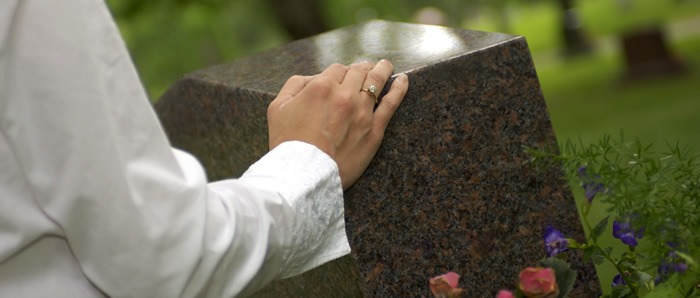
There are many factors that one must consider when looking at individual grief response. Among other things, the nature of one’s death often determines how we react. It is one thing to lose a mother or father who has lived many years but it is another to lose a loved one who has died tragically or in the early years of life. These separate events affect each person differently.
As a distinct person, you bring to your grief your unique experience in living and your own resources in trying to understand and cope with loss. Family, friends, neighbors and perhaps religious faith will be among the resources that may help you to face your grief. But all too often many people overlook THEMSELVES as a possible source of strength.
I can vividly remember my mother sitting up with my father night after night in those last days of his life so many miles from home in a strange city. While she endured a great physical and emotional drain on herself, miraculously she somehow still had the ability to cope with all the demands asked of her in the days that followed his death. I was truly amazed at how well she was able to deal with what was happening to her. How was she able to do it? In addition to other resources, she found within herself a “reserve of power” that I am sure she didn’t even know she had, and she was able to draw from it. This “reserve of power” helped her to sustain her.
 DON’T UNDERESTIMATE YOURSELF AS A POSSIBLE SOURCE OF STRENGTH. You are not new at living life! You have made it this far in living because you have successfully learned how to meet other difficult times. Overcoming such hurdles makes us stronger and seems to give added strength for courageous effort. While this occasion is quite different from other crises you have encountered in life, nevertheless, with perseverance, determination, faith and hope, you can find the strength to meet this experience. You may surprise yourself. You may find yourself drawing from a “reserve of power” that you didn’t even know you had.
DON’T UNDERESTIMATE YOURSELF AS A POSSIBLE SOURCE OF STRENGTH. You are not new at living life! You have made it this far in living because you have successfully learned how to meet other difficult times. Overcoming such hurdles makes us stronger and seems to give added strength for courageous effort. While this occasion is quite different from other crises you have encountered in life, nevertheless, with perseverance, determination, faith and hope, you can find the strength to meet this experience. You may surprise yourself. You may find yourself drawing from a “reserve of power” that you didn’t even know you had.
Visiting at the Funeral Home
Value in Visiting
In other days, it was the custom for friends to come calling at the family home where the body would be viewed. Today, it is more common in our society to visit at a funeral home where hours have been scheduled for viewing and visiting.
On other occasions, you may have been one of the persons who called on a friend at a funeral home. This may be the first time in you life that you are now the one being visited. You undoubtedly have many questions. How much time should I set aside for visiting? Do I need to be present the whole time? Should the casket be open or closed? What is expected of me? What might I expect from others? There is no “proper” amount of time that should be set aside for visiting. Some families feel that two or three days is necessary, while others may require only a few hours in the night before the service or simply an hour or two on the day just prior to the funeral. Whatever is “appropriate” for you will have been determined by you, and perhaps your family, in consultation with the funeral director. His experience will be helpful in reaching your decision.
There are some families who request no visiting. I think this is unfortunate. While I understand that in some situations there may be extenuating circumstances and good reasons for this decision, I strongly encourage families to have a period for visiting. I believe that visiting is an important part of the grief process. You may want to be left alone with your grief. Certainly it is your right to withdraw into yourself, but to close yourself off from others is to deny both your friends and yourself a companionship you need at this time. It is true that you may find it very difficult to relate to others in this setting and will have to make a genuine effort to do so. But support from other family members and friends can be a real source of strength. They can help you keep a realistic grasp and perspective on life.
 The time for visiting is informal, almost “quasisocial” time. Unlike the funeral, there is no structured format. The feelings that prevail during this time of visiting need not be morbid. As friends may share with you their memories of your loved one, you may find that there will be times when you will cry together and times when you will laugh together. In the presence of death, we are still social beings. It is consoling to hear from others pleasant memories they might share about the deceased.
The time for visiting is informal, almost “quasisocial” time. Unlike the funeral, there is no structured format. The feelings that prevail during this time of visiting need not be morbid. As friends may share with you their memories of your loved one, you may find that there will be times when you will cry together and times when you will laugh together. In the presence of death, we are still social beings. It is consoling to hear from others pleasant memories they might share about the deceased.
Visiting provides friends and relatives an opportunity for personal contact that is often not possible on the day of the funeral. Friends want to offer you their personal expressions of sympathy. They want you to know that they care about you.
You may find that more people will come during the hours of visiting than at the time of the funeral. This is another good reason for having visiting hours set aside. Friends may not be able to leave work to attend the service. Many companies do not permit their employees time off to attend funerals other than for those for immediate family. Visiting is the only time they can be with you.
Most funeral homes schedule visiting for a few hours in the afternoon and the evening, with a break for dinner. You may wish to stay for the entire period of visiting or for only a few brief periods of time. This is your choice. It is not necessary for you to remain for the entire time if you choose not to do so. Some people find it helpful to go home for periods of rest. However, it is desirable that at least one family member or a close personal friend be present at all times. Perhaps family members can take turns receiving those who call. Friends will be asked to sign a visitors’ book. This will let you know who has called so that you can later acknowledge your appreciation for their visit.
Most funeral homes will have a coffee lounge where you can go for a short break. I encourage you to take time to do this, especially if you have decided to remain during the entire period of visiting. A break will relax and refresh you.
“Should the Casket be Open or Closed?”
The matter of an open or closed casket is a personal one. Some families like to have the casket closed with a recent photograph placed near or on the casket. You may wish the casket to be closed for visitors but open for a brief time just prior to visiting so that you and your family can have a private viewing. Generally, shortly before the funeral service, if conducted at the funeral home, friends will be asked to be seated in the chapel giving you and your family the last few moments to be alone with your loved one. You may ask at this time to have the casket opened once again for a brief private viewing. Once the casket is closed for the service, it should remain closed.
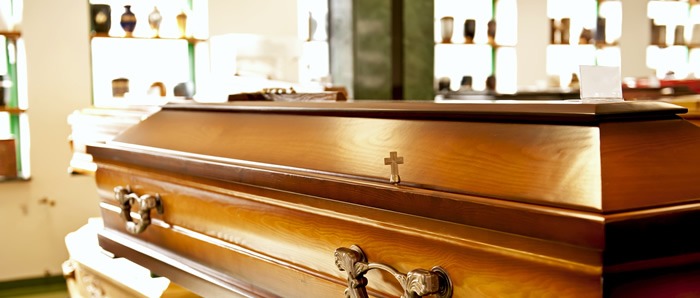
Some families will request that the casket be open during the time of visiting. In recent years, the funeral industry has come under attack for what has been described as a “disguise of death through the use of cosmetics” prompting such reaction as “doesn’t he or she look good”.
There is, of course, a danger in dressing up the deceased to such a degree that we may try to deny that anything has happened. However, I do believe that a valid rationale can be given for an open casket and the use of cosmetics.
An open casket helps some people accept the reality of death. No matter how much cosmetics have been applied, it is obvious that the person lying in the casket is dead. A simple touch will confirm this. The purpose of viewing and the use of cosmetics should never distort that reality. As I have said earlier, your loved one is not resting. Your beloved has died and is alive no more.
Cosmetics can be effective where one has suffered a great deal before death. When cosmetics have been applied by the funeral director, a more acceptable image is left in your mind rather than the one you had at the time of death. You can now have an image of how he or she once was. I know that some people would still argue with me about this. But I believe that it is quite acceptable when cosmetics have been used for this purpose.
We must not overlook, also, the importance of the open casket for the community of friends. Some friends become as close, if not more so, than family members. They, too, should be permitted to see their friend “one more time”. It is no secret that when grandad or grandma dies he/she may be more grieved for by life-long companions, bridge partners or fishing buddies, who may not have seen the person for some time.
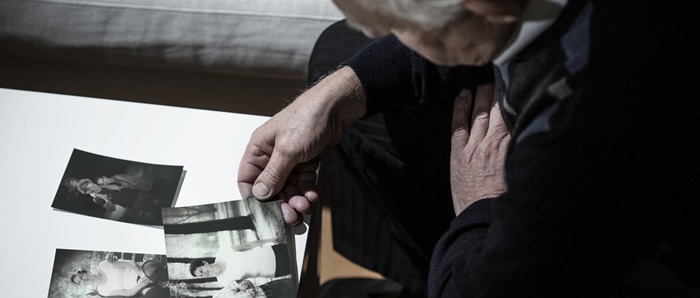
Of course, there are many good reasons why the casket may have to be closed. However, it is the experience of many funeral directors that when properly presented in the interests of the bereaved, a large percentage of those who were thinking initially of a closed casket, after identification, insist upon its being open to the very last moment before the funeral services.
“What Is Expected Of Me?”
Many persons become concerned about what is expected of them when they receive visitors. I tell them to be themselves. By this, I mean, be who you are at the moment.
There is no need to put on a false front. You need not be concerned about how people will look at you wondering how you are “holding up”. At first, friends will feel awkward, looking to you to see how they should react. Remember the time you were a visitor and how you felt. You can help your friends feel more relaxed when you are yourself. In this instance, you can help them as much as they want to help you.
“What Should I Expect from Others”?
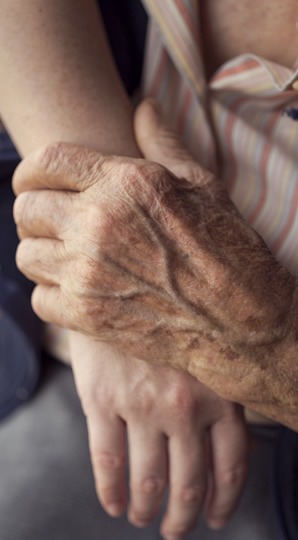 What should you expect form your visitors? Your friends want to be with you to offer their companionship, to share with you their feelings, to extend their sympathy and their sincere desire to say something that will comfort you. A warm handshake and simply to say that one is sorry is often sufficient. But more often than not, what is said may anger or bewilder you rather than give comfort. Depending on the nature of the death, you may hear such comments as:
What should you expect form your visitors? Your friends want to be with you to offer their companionship, to share with you their feelings, to extend their sympathy and their sincere desire to say something that will comfort you. A warm handshake and simply to say that one is sorry is often sufficient. But more often than not, what is said may anger or bewilder you rather than give comfort. Depending on the nature of the death, you may hear such comments as:
- “He or she is better off.”
- “At least he or she didn’t suffer.”
- “At least he or she is now at rest.”
- “It’s God’s Will.”
- “God needed him or her more than you did.”
- “After all, you can have other children.” or “It’s good that you have other children.”
- “YOU look so good!”
- “I know exactly how you feel.”
These, and other variations, may leave you puzzled and upset. But keep in mind that many of these people who have come to call may not have experienced personal grief in their own lives. They are groping for words, and most of us feel awkward in such circumstances. We may feel that we have words for every occasion, but being so very human, we find that our words fail us. We want so much to say the “right” thing. Accept that your friends are trying to share your grief in the best way they can. They feel insecure and ill at ease – and perhaps frightened – in the presence of death. Their intentions are sincere even if their words are somewhat disturbing. Try not to dwell on what is said but rather on their honest effort to communicate their feelings. Simply say, “Thank you for coming”.
During the hours of visiting, you may be surprised at some of the people who show up – people you have not seen for years. You wonder how they know. This has always fascinated me. Even if no newspaper announcement has yet appeared, people will come from the far corners of your past.
 Many of these acquaintances you will be pleased to see as you share memories together. Others you may not be so pleased to see. Perhaps some of these “friends” had known of the illness of your loved one but never came to call when he or she was alive. “They never called then – why bother to come now”? Try not to judge the actions of others.
Many of these acquaintances you will be pleased to see as you share memories together. Others you may not be so pleased to see. Perhaps some of these “friends” had known of the illness of your loved one but never came to call when he or she was alive. “They never called then – why bother to come now”? Try not to judge the actions of others.
A Word About Children
All too often, I have seen children excluded from visiting hours and the funeral service. Children are kept away – at home with a baby sitter or other family member. You may believe that they are too young to understand. You may also be worried that you cannot answer some of the questions they might raise, or you may be concerned about their behaviour. But you CANNOT and MUST NOT shield a child from death. You are doing him or her no favour; in fact, you could cause harm that could affect him/her through a lifetime.
I recall just one example, of many, where at the death of his father, a young boy 8 years of age was not allowed to visit at the funeral home or attend the service. He was simply told that his father had “gone away”. This left him with the impression that his father had gone away because he didn’t love him any more. He also began to feel that his father had left because of him. Somehow he felt that he was to blame. Needless to say, great damage was done to this child.
Young children are very impressionable. By excluding them from the family circle, in the belief that you are protecting them, at the time when they especially need to feel that they are a real part of the family, you can hurt them deeply. Through all of this mystery, you may be raising even greater fears in their minds when it appears that you are hiding something from them or that they are not a a part of your life.
At what age should children be included? Generally speaking, my opinion is that if a child is old enough to ask questions, they are old enough to be included. It is difficult to give a blanket perspective on what should or should not be said or done in dealing with children since there are so many variables involved, e.g., the age of the child or children, the nature of the relationship to the deceased, and the cause of death. Do ask your clergyman and/or funeral director for guidance in such matters if you are not sure what is best for your particular situation. They are experienced in these matters. You will also find a section at the back of this book on SUGGESTED BOOKS TO HELP YOU IN UNDERSTANDING AND COPING WITH GRIEF. Refer to the resources, “About Children” and “For Children”.
Basic Guidelines for Helping Children in the Time of Grief
- Children need to be close to you
Don’t isolate children. They need your love. They need to feel that they are a vital part of the family and a part of the decisions that are made. They need to understand the feelings you are expressing. They need to be assured that their world is not falling apart.
- Children should be encouraged, but not forced, to come to the funeral home during the hours of visiting and/or to attend the funeral service.
Let them make the decision. But be careful that you don’t influence that decision by phrasing your question in such a way that they will feel obligated to do as they feel YOU would have them do.

- Children’s questions should be answered honestly.
Speak to them in their own language.While the questions children ask may make you feel somewhat uncomfortable, answer honestly and in the best way you can. For example, don’t say, “Grandpa is sleeping”. This will make the child fearful of going to sleep.Examples from nature and the changes of the seasons are often thought to be helpful in explaining death to younger children when death has been natural.
- Children should be allowed to see and touch
It is a good idea if you and your child, or children, arrive a few moments before the hours of visiting. This will give you an opportunity to explain what will be happening when the visitors arrive.Let children know that it is O.K. to express their feelings. But don’t force them. Never force a child to do anything he or she doesn’t want to do. Let their feelings be expressed freely. Don’t be concerned if they show no emotion. Let them deal with it in their own way, but with your support and understanding.If they wish to touch the body, let them do so. They need to see that life is no more. While you may believe that all this is rather traumatic for a young child, keep in mind that the child needs to be faced with the reality of death on his or her own terms. In the long run, despite some bad dreams a child may have, they will appreciate your concern for them.If they wish to stay and greet visitors with you, let them do so. Don’t push them aside. Make them feel that they are welcome. They will probably, however, soon go off with their friends to the coffee lounge or elsewhere. But let them make that choice.
- Children need to believe in the future
Remember that you are dealing with young children. Be patient, There is only so much they can absorb and understand. Their attention span is limited. Watch and listen.You need to assure them that they are loved and valued. You must give them something to believe in and hold onto. That assurance can come only from you, the parent.
Facing the Immediate Future
“Where do I go from here?”
You are wondering, “Where do I go from here”? You may feel that life isn’t worth living without your loved one. “How can I go on”? So many problems face you – so many responsibilities. You’re not sure where to turn or what is to be done first.
There are insurance papers to be processed, legal affairs to settle, notes to be written to those who have sent flowers or made contributions to a favourite charity. Financial concerns may worry you. Returning to a job after having been away for days or weeks – or having to think about finding a job – troubles you. There may be others to care for – not just yourself. You are uncertain that you are up to making all the decisions that have to be made in the weeks and months ahead.
 “Where do I begin?” You feel so lost and alone. The best advice is, “Live only one day at a time”. Begin where you are. Facing the future is not easy. NO one said it would be. But what are your alternatives? You WILL and you MUST do what is necessary.
“Where do I begin?” You feel so lost and alone. The best advice is, “Live only one day at a time”. Begin where you are. Facing the future is not easy. NO one said it would be. But what are your alternatives? You WILL and you MUST do what is necessary.
Adjusting to the absence of your loved one will take time. But “How much time?” This, of course, depends on many variables including the relationship to your loved one, the cause of death, along with other factors.
Again, because no two persons are alike, no two persons will deal with grief in the same way. There is no prescribed formula for “instant recovery”. It will not happen overnight – or in a week or two – or even perhaps after many months. Just when you think you are getting on top of things, something will all of a sudden pull the props out from under you – an anniversary or birthday, a reminder of something that calls to memory your loved one, or a special time of the year. You will think that you are right back where you started. You may become discouraged and depressed. You may begin to think that there is something wrong with you.
Be assured that you are not losing your mind. Most people have similar experiences. Such experiences are normal and a part of the grief-work process. One lady described it to me this way, “It’s like riding a roller coaster. You experience the highs and lows – and often with about as much speed!” Be patient. Gradually you will find that you have started to walk life’s path once again with confidence, determination, and even with enthusiasm for the future.
In the next few pages, I want to talk with you about those IMMEDIATE weeks following the funeral. These suggestions have been drawn from experience in working with many people.
Avoid Hasty Decisions or Having Decisions Made for You
Take time to make decisions that may affect your future. You have not had ample time to reflect and to assess your needs, or the direction your life will take. Your judgement is uncertain now. Don’t rush into decisions you will later regret.
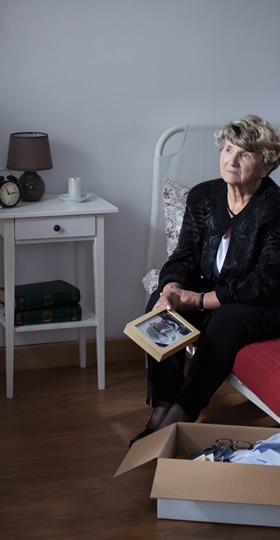 “Should I sell the house?”
“Should I sell the house?”- “Should I move to another part of the city or even to a new city and start over?”
- “Should I move in with my son or daughter?”
Too often I have seen people make hasty decisions that they have later come to regret. The idea that a change or a complete start somewhere else will take away the pain of grief simply is not true. The opposite is often the case.
You are far wiser to stay in your home where surroundings are familiar to you. This is no time to uproot yourself. You have already had a major upheaval in your life. Unless absolutely necessary, postpone making major decisions, especially within the first year of bereavement. It may be true that the house is too large and difficult to maintain. But make your decision when YOU are ready to make it with good reasons which YOU have carefully thought out.
There are times when a grieving member of the family lets another person pressure him/her into making decisions or, worse still, lets another make the decisions for them. Out of good intentions and concern for a remaining parent, for example, it is not uncommon to have children who have grown up and left home insist that the parent should move in with them and their family.
I recall a daughter and son-in-law who had her mother move in with them the day of the father’s funeral. The son-in-law was very accommodating at the time the decision was made. He felt compassion for his mother-in-law. Those sentiments, however, quickly vanished when weeks later he began to resent the loss of his privacy and what he considered to be a disruption of their family life. From the day of the funeral, the daughter would not let her mother out of her sight for any prolonged period of time. Needless to say, the mother was unhappy to be so over-protected and to have lost her freedom. Tensions developed and tempers flared. At the time the decision was made, it seemed like such a good idea. But the good idea quickly soured.
Take your time in making decisions concerning major changes in your life. While you might wish to ask others for advice on matters of concern, make your own decision about your future.
Don’t Run Away
People often make the mistake of believing that it is a good idea to “get away” for a few days following the funeral. After all, when we have been burdened with our jobs, we have been refreshed after having taken a vacation. As it was always a happy time, what is there to fear?
 By going away shortly after the death of a loved one, you will find that you have only packed up your grief and taken it with you. You cannot take a vacation from grief. In fact, the feelings of loneliness and depression are oftentimes made more severe. You cannot run away from grief. The sooner you come face to face with what you have to do, the sooner you can begin to recover. This does not mean that at some later date, after you have had time to begin pulling things together, a break might not be beneficial. But a vacation should never be taken as a means to escape your grief.
By going away shortly after the death of a loved one, you will find that you have only packed up your grief and taken it with you. You cannot take a vacation from grief. In fact, the feelings of loneliness and depression are oftentimes made more severe. You cannot run away from grief. The sooner you come face to face with what you have to do, the sooner you can begin to recover. This does not mean that at some later date, after you have had time to begin pulling things together, a break might not be beneficial. But a vacation should never be taken as a means to escape your grief.
Don’t Isolate Yourself
There is a story about a mother who had lost her only son in World War II. On receiving notification of his death, she pulled all the drapes in her house, withdrew into herself, and never left her home until her own death 33 years later. Her only contact with the outside world had been through a friend who had done her banking and grocery shopping.
This certainly is an extreme example of isolation, and it is definitely abnormal. For many people, it is difficult to become interested in life again. That which had given meaning and substance to life is now gone. What is there to live for? It is NOT abnormal to feel something like this in the first few weeks of your grief. But it does become abnormal when it is prolonged for an indefinite period of time.
After the funeral, a part of you may just want to be left alone for a while. This is quite normal. You have had so much happening in your life over these past few days, you feel the need to be alone with your thoughts. You want to rest. Make this known to your family and friends. Assure them that you are not withdrawing from life. They will understand. At the same time, let your friends know that their companionship is appreciated and that there will be times when you will need support. Don’t have them guess how they think you feel. They may guess wrongly.
When your friends offer their sincere help, they usually mean it. Accept it. Let them know how they can be helpful when they ask. Don’t be afraid that you will become dependent on them. In the first few weeks, you will find that they are more available than they will be later. Reach out now.
Isolating yourself from others only makes you feel worse. What is to be gained from such action? Do you want people to feel sorry for you? They won’t. They will only pity you.
Are you trying to do penance for something you felt you did wrong to your loved one and now you are demonstrating this by punishing yourself for all to see? We have all done things we wish we hadn’t. But what is past is past. We can’t go back. We cannot change that which can’t be changed. We accept what we must accept and go on living with the hope that we may have learned something from our mistakes along the way.

Try to get out of the house or apartment at least once each day. It won’t be easy at first, and you may find that you will have to force yourself. But life is for the living. Don’t fall into the valley of self-imposed depression. It won’t do you or others any good. In fact, if you are always depressed, people will want to stay away from you.
When friends extend a dinner invitation, don’t turn it down. Going to dinner at a friend’s house where you and your husband may once have gone together may be difficult for you. But do it! You may find that your friends will feel somewhat awkward at first. They won’t be sure if they should mention his name and may try to avoid it. They will look to you for a cue.
Don’t fall into a situation I once heard described.
A widow was riding in a car with a couple who had been friends with her and her husband over many years. They had gone to church together and to social functions. The man remembered something funny that had once happened to the four of them. He started to tell about it, but then he stopped and said, “I’m sorry.” The widow replied, “Don’t be sorry. For a year, nobody has even mentioned his name in my presence. I’d love to laugh as once we laughed together.”
Let your friends know how you feel and that it is all right to talk about him/her in your presence. All of you will feel better for it.
When you feel you are ready, seek out new social outlets. You will eventually find that you will develop new interests and may become involved in new activities. But this will take time. Often people have found helpful support from others who have experienced a similar death of a loved one. You need not feel alone. There are many people who want to help you.
Take Care of Your Health
As I have said earlier in this book, bereavement is physically and emotionally draining. You may be even more run down if there has been a longterm illness before death. It is easy to neglect your health while you are in grief because you may not particularly care.

Do not neglect your health. You owe it to yourself to maintain your health. This is particularly true where you are responsible for the welfare of others in your household. I encourage you to have a physical check-up shortly after the funeral even if it doesn’t make sense to you. You are more susceptible to disease. You may find yourself with more colds this winter. Unusual symptoms should be checked out.
Maintain a proper diet. If you are by yourself, you will find that one of the most difficult things to do is to eat alone. It will be easy for you simply to skip a meal because you don’t feel hungry or feel like preparing something. The pleasure in preparing a meal to share with someone has gone. But you have to keep up your strength. Eat reasonably even if there is no enjoyment in it.
Get adequate rest. Many nights will seem like an eternity. You won’t be able to sleep. This is normal. Get up and make yourself a cup of hot milk. Try reading a book. Then after a while, return to bed. While you may have trouble sleeping in the first weeks, you can nevertheless get rest by lying down. Try to meditate on positive things. If insomnia persists, see your physician who will help you to renew a normal sleeping pattern.
Stay away from drugs. Again, another word of caution. Unless you are under a doctor’s care for a specified ailment, stay away from drugs as an escape from grief. In using drugs, you will find that you are only postponing and often intensifying your grief. There is no short-cut to recovery.
Make Use of Community Resources
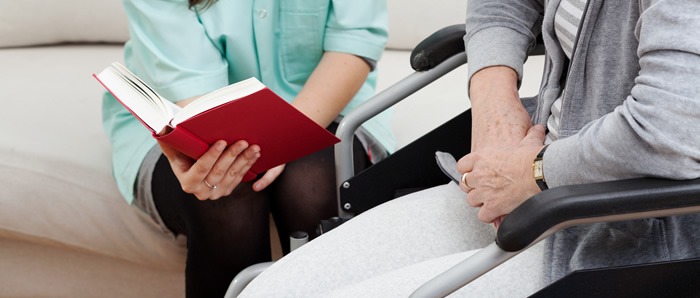
Within a few weeks after the funeral, you may find that the many friends who were near you have now disappeared. You now seem even more alone. But you need not be. We are fortunate that today many communities offer a variety of resources for the bereaved. The larger the community, the more varied and diversified the reservoir of resources. These range from self-help groups to various agencies and organizations offering advice and help. These people know what it is like to suffer the loss of a loved one. They are there to help you. I know of many people who have been greatly helped by such groups. In fact, many of them are now helping others just as they had once been helped.
Your funeral director, clergy, or physician will know of these resources. Ask them about what is available in your community. These resources are there for you to use. Even if you have a family that is close to you, it is sometimes good to have outside sources from which to draw.
Seek Professional Advice
There is nothing more valued than a trusted friend. If you have such a friend, you are indeed fortunate. Friends want to help and they often do. But keep in mind that their experience is not your experience. Their intentions are sincere and appreciated, but sometimes their advice may miss the mark. However, this does not take away from your friendship.
There may be times when you feel things are closing in on you – when things are a little more than rough. You feel that you need a different kind of help other than what your friend can give. To seek professional advice is not a sign of weakness. In fact, to acknowledge that you need someone to help you in working through a problem is a sign of strength.
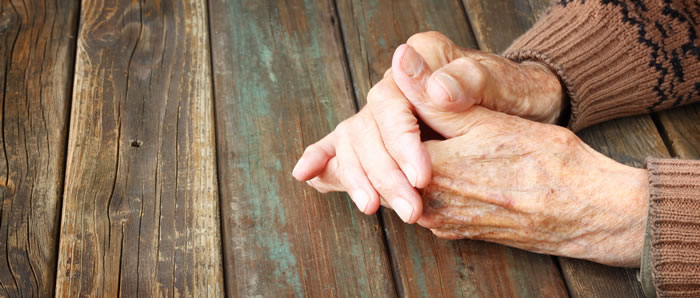
Don’t hesitate to seek assistance from your clergy, physician, funeral director, or other professional who has been trained in working with the bereaved and who understands your needs. These persons can help you to help yourself. Allow yourself to be helped.
In the weeks and months that follow, you will begin to put the pieces of your life back together. The scar will remain but you will be able to live again. We cannot see a hundred years or a hundred days or hours ahead, or even tomorrow morning. We must have patience and faith to take the first step we can see, and trust for the next step to show itself, and trust that the light will ever lead us to meet each obligation and opportunity, knowing that there are plans and purposes and a future.

